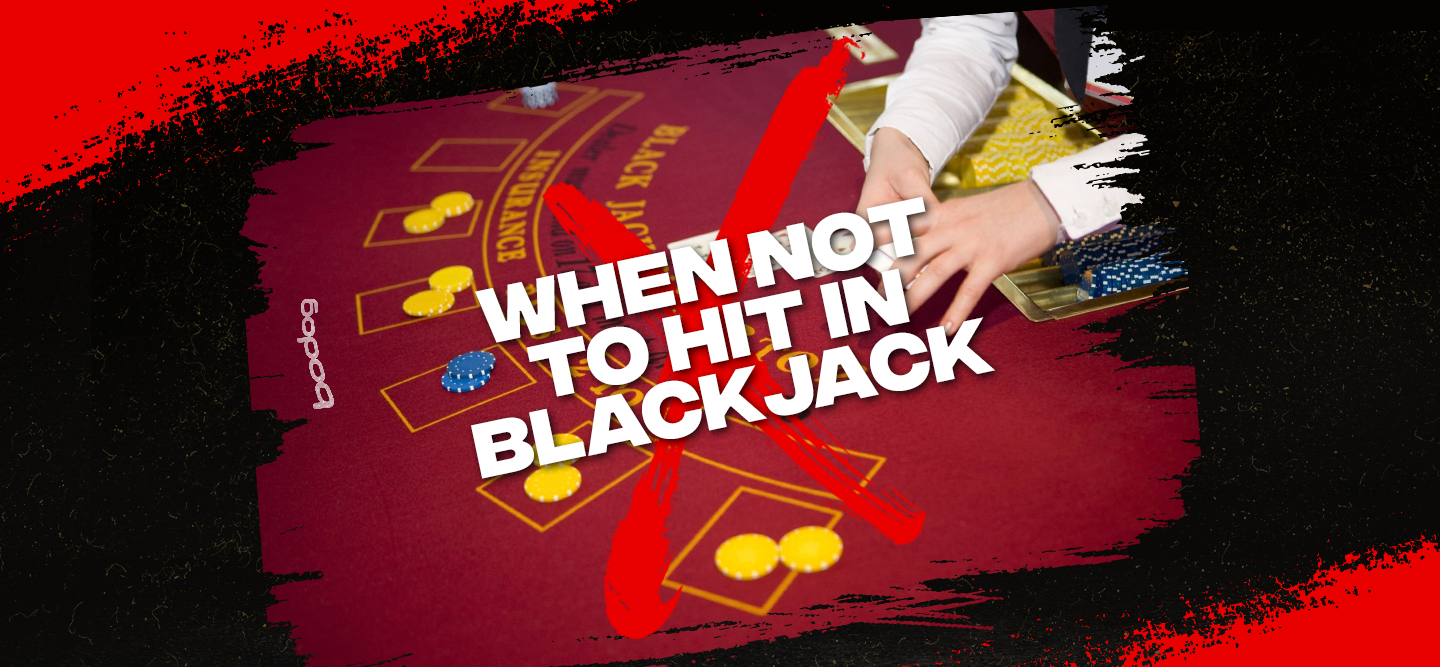When Not to Hit in Blackjack

It’s easy to see why blackjack is the most popular table game at Bodog Casino – and all around the world. Blackjack offers the perfect blend of simplicity and strategy; it’s just you versus the dealer, and whoever gets closer to 21 points without going bust is the winner. All you have to decide is whether or not you want to draw another card. The big question? When not to hit in blackjack. Let’s dig into it.
There are a few different ways to do this in blackjack, but not so many that it gets confusing. The simplest choice is to hit, meaning you draw another card and add those points to your running total. Hitting is the one essential move in blackjack that everyone loves to make, but there’s a right time and a wrong time to do it.
Learning when not to do something is usually the better approach. Neuroscientists have discovered that the part of the brain known as the cerebral cortex is hard-wired to say “No” when you get the impulse to do something – but only if it recognizes that you’re about to make a mistake. That’s why they call it the School of Hard Knocks.
Instead of learning blackjack the hard way, let’s learn it the easy way with some blackjack tips. Here’s a summary of when not to hit in blackjack the next time you’re playing at Bodog Casino. These general rules are part of a simplified strategy that you can use at all the standard blackjack tables; once you’ve got these rules down pat, you can make the move from near-optimal to optimal by learning the “basic” blackjack strategy tweaks for any variant you care to master.
1. Don’t Hit With Hard 17-21, or Soft 19-21
Let’s start with the most obvious situation, when you’ve already got enough points in your hand that you’re probably going to win, no matter what the Dealer’s up-card may be. The cut-off for “hard” hands, meaning those that don’t contain an 11-point Ace, is 17 points. The Ace can be worth one or 11 points, so there’s enough wiggle room with Soft 17-18 to require a different approach.
To show you why this works, let’s say you get dealt a Hard 17, and let’s give the dealer the worst possible up-card for them: a Five. Your chances of going bust when you hit are 69%, compared to only 43% for the dealer. Hitting here to win even money is clearly the wrong choice.
2. Don’t Hit With Hard 12-16 Against a Low Up-Card
When we talk about “low” up-cards in blackjack, we mean when the dealer is showing any card between a Deuce and a Six. The reason these cards are bad for the dealer is because they are forced to draw at least two more cards, since they always have to hit on 16 or lower. That significantly increases their chances of busting out.
Here are the dealer’s bust probabilities (rounded up or down) for each of the low up-cards:
2: 35%
3: 38%
4: 40%
5: 43%
6: 42%
This is so bad for the dealer, it makes sense for you not to hit even when you’ve got a measly 12 points in your hand. Your chances of busting when you hit on 12 are only 31%, but there’s more to it than that; if the dealer doesn’t bust, you still have to score more points to win the hand, and that just won’t happen often enough to make it worth hitting in these spots.
3. Don’t Hit With Aces or Eights
If you’ve been dealt a pair of Aces or a pair of Eights with your first two cards, you definitely don’t want to hit – you want to split that pair instead. When you split, each card becomes part of its own hand, thus doubling your bet, and you receive exactly one more card on top of that.
The benefit with these specific pairs is pretty straightforward. By splitting your Aces, you now have two very good chances of making 21, which is a lot better than hitting on either two or 12 points. Splitting your Eights gives you two shots at making 18, rather than being stuck with a middling 16 and risking a 62% chance of going bust if you hit.
4. Don’t Hit With 22, 33, 66, 77 or 99 Versus a Low Up-Card
These are the other splits you’ll want to make when the dealer has a low up-card; if they’re showing a Seven or higher, keep your pair together and treat it like you would any other hard hand with that number of points in it.
The danger of hitting with Sevens (14 points, 56% risk of busting) or Nines (18 points, 77%) should be obvious enough even to newer players. The lower pairs are a bit less obvious, but the math is clear: Split those cards, and let the dealer assume the risk instead.
5. Don’t Hit With 10-11 if Dealer Has Fewer Points
It’s tempting to hit when you’ve got a 10 or 11 points – you might make 21 on your next card. But that’s exactly why you should double instead, provided the dealer doesn’t also have 10-11. Your chances of winning when you double down with 10 are 55.3%, increasing to 58.1% when you have 11. And you’ve doubled your bet as well. It’s a no-brainer.
Play Blackjack at Bodog Casino
We should also mention that you shouldn’t hit with Hard 9 or Soft 16-18 versus a low up-card – you should double down instead. But now that we’ve covered all the times when not to hit in blackjack using this near-optimal strategy, you know it’s the right thing to do with every other situation you’ll face, so it’s time to hit the tables at Bodog Casino and get those cards in the air. Best of luck on the felt.